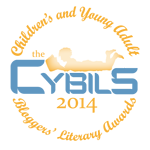

Back in 2012, I found
Daughter of Smoke and Bone by
Laini Taylor to be both romance and fantasy, two genres I'm not fond of in and of themselves. I need something more in those genres, such as a strong character, or, in the case of
Daughter of Smoke and Bone, a mystery. Who was the main character, Karou? Why was the guy with the wings always hanging around her? There was a journey thing going on, as Karou discovered who and what she was. I can't find a post on
Days of Blood and Starlight, the second book in the trilogy, but I recall feeling it was a connector, which second books in trilogies often are.
Dreams of Gods and Monsters, the last book in the trilogy, is more clearly a romance. There's various other things going on, but the real significant storyline here is all about Karou and Akiva. Their eyes meet across a crowd. There are many paragraphs about kissing. Lots of relationship stuff. There are teases for the reader, too. Will they kiss? Someone shows up at the cave opening and No! The kiss is off! Will they get together for some real hot and heavy stuff? Oh, they're getting closer...closer...No! Akiva has disappeared!
You can probably tell I'm not that keen on Karou and Akiva anymore. No, Liraz was my big interest in this book. I won't tell you who she gets together with because that's the best surprise.
The Significance Of Romance And Marketing "Gods And Monsters"
I happened to read
A Billion-dollar Affair in the Oct. 24 issue of
Entertainment Weekly while I was reading
Dreams of Gods and Monsters. Sales of romance are huge, there's an enormous market. At the same time, though, author Karen Valby says the "long-ridiculed" genre is "dismissed by the critical mass." As a result, I started wondering how
Dreams of Gods and Monsters is being marketed. Is it being promoted as a fantasy or paranormal romance, which could bring it to a large and appreciative audience? Or is it being marketed as something else, perhaps to avoid the romance label?
In a
USA Today interview, Taylor talks about working on a short story for a romance anthology, so she thinks of romance as a genre she works within, at least some of the time
. I think there is a romance thing going on in the publisher's marketing of the book, but it's subtle. The publisher's copy at its website includes the line "They begin to hope that it might forge a way forward for their people. And, perhaps, for themselves--maybe even toward love." There's also talk of various beings fighting, striving, loving, and dying.
Wait. I just realized. My romance reading is limited to historical mysteries with couple characters. I don't read advertising copy for romance novels. "They begin to hope that it might forge a way forward for their people. And, perhaps, for themselves--maybe even toward love" may be exactly how a romance novel is marketed.
Dreams of Gods and Monsters is a Cybils nominee in the
Young Adult Speculative Fiction category.
From
the streets of Rome to the caves of the Kirin and beyond, humans,
chimaera, and seraphim will fight, strive, love, and die in an epic
theater that transcends good and evil, right and wrong, friend and
enemy. - See more at:
http://www.hachettebookgroup.com/titles/laini-taylor/dreams-of-gods-monsters/9780316134071/#desc
They
begin to hope that it might forge a way forward for their people. And,
perhaps, for themselves--maybe even toward love. - See more at:
http://www.hachettebookgroup.com/titles/laini-taylor/dreams-of-gods-monsters/9780316134071/#desc
They
begin to hope that it might forge a way forward for their people. And,
perhaps, for themselves--maybe even toward love. - See more at:
http://www.hachettebookgroup.com/titles/laini-taylor/dreams-of-gods-monsters/9780316134071/#desc
They
begin to hope that it might forge a way forward for their people. And,
perhaps, for themselves--maybe even toward love. - See more at:
http://www.hachettebookgroup.com/titles/laini-taylor/dreams-of-gods-monsters/9780316134071/#desc
They
begin to hope that it might forge a way forward for their people. And,
perhaps, for themselves--maybe even toward love. - See more at:
http://www.hachettebookgroup.com/titles/laini-taylor/dreams-of-gods-monsters/9780316134071/#desc
They
begin to hope that it might forge a way forward for their people. And,
perhaps, for themselves--maybe even toward love. - See more at:
http://www.hachettebookgroup.com/titles/laini-taylor/dreams-of-gods-monsters/9780316134071/#desc

 I finished the last book I'd taken from the Cybils lists last night, and not a moment too soon. The finalists for the Cybils Award will be announced tomorrow.
I finished the last book I'd taken from the Cybils lists last night, and not a moment too soon. The finalists for the Cybils Award will be announced tomorrow.










































